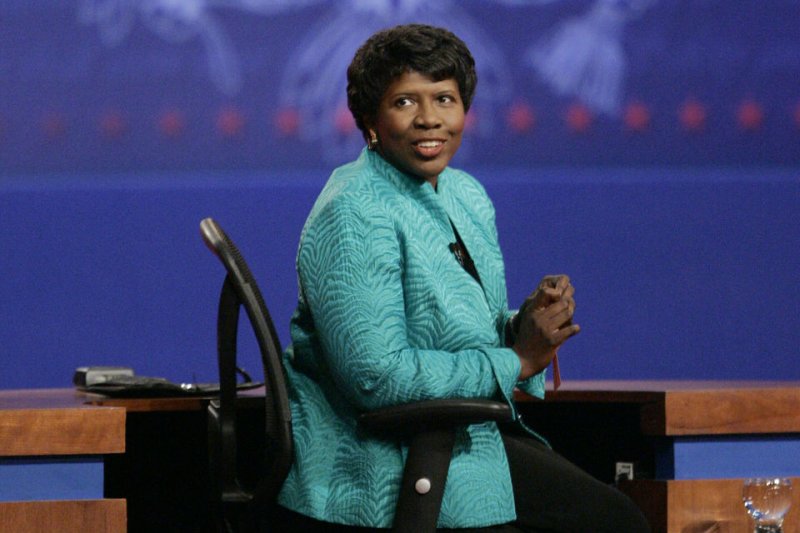1 of 2 | Debate moderator Gwen Ifill speaks to the audience before the the vice presidential debate between Republican Alaska Gov. Sarah Palin and Democratic Sen. Joe Biden of Delaware at Washington University in St. Louis, Mo., on October 2, 2008. File Photo by Brian Kersey/UPI |
License Photo
NEW YORK, Nov. 14 (UPI) -- Veteran broadcast journalist Gwen Ifill, co-anchor of The PBS NewsHour and moderator of PBS's Washington Week, died Monday at age 61.
Ifill, a reporter for nearly 40 years, had stints at the New York Times, Washington Post and NBC before joining PBS to become the first African-American woman to anchor a major political television show, died Monday at a hospice center of endometrial cancer.
During her distinguished, decades-long career, Ifill covered seven presidential campaigns and moderated vice presidential debates in 2004 and 2008, while spending the last two decades at PBS. Her co-anchor duties with Judy Woodruff on PBS's NewsHour made for the first prime time news program anchored by two women, after Ifill had become the first black woman to host a show like Washington Week.
Ifill became one of the most trusted anchors and reporters in the business. Woodruff said her friendly, but authoritative tone gave her credibility and she did not mind telling people when she thought they were wrong while maintaining respect for her interview subjects.
"It is with extreme sadness that we share the news that Gwen Ifill passed away earlier today surrounded by family and friends," Paula Kerger, PBS's president and CEO, said in a statement.
"Gwen was one of America's leading lights in journalism and a fundamental reason public media is considered a trusted window on the world by audiences across the nation. Her contributions to thoughtful reporting and civic discourse simply cannot be overstated."
Ifill was the daughter of a preacher, who gathered his family around the television to watch the news every night. She was inspired to become a reporter by the time she was nine years old, saying in a 2013 interview that she noticed there was not anybody on TV "who looked like me in any way."
After earning a degree in communications from Simmons College in 1977, Ifill started her career as an intern at the Boston Herald-American -- which turned into a job because she exceeded expectations, and then a coworker left her a hateful note that included a racist slur.
"I learned my lesson: Take the job that is offered to you," Ifill said in 2012. "No matter how you get in the door, just get in there."
In 1981, she left Boston to join The Baltimore Evening Sun, spending three years there, and then was hired in 1984 at The Washington Post. In 1991, Ifill joined the New York Times where she started off covering Bill Clinton's presidential campaign and as a White House correspondent.
Tim Russert hired her at NBC in 1994, where she worked closely with Russert and appeared often on Meet The Press, before moving to PBS in 1999 when she was hired to host Washington Week and report for The NewsHour with Jim Lehrer.
When Ifill and Woodruff were made co-anchors of NewsHour in 2013, Ifill said their presence behind the desk was meaningful because "a little girl now, watching the news, when they see me and Judy sitting side by side, it will occur to them that that's perfectly normal -- that it won't seem like any big breakthrough at all."
Ifill's dedication to journalism and accountability for what she reported -- "My job as a reporter," she once said, "is not to know what I think" -- gained and maintained the trust of readers and viewers on all sides of the political spectrum, which is rare at a time when many would prefer to hear news reports they agree with rather than the truth.
"Her contributions to thoughtful reporting and civic discourse simply cannot be overstated," Kerger said. "She often said that her job was to bring light rather than heat to issues of importance to our society. Gwen did this with grace and steadfast commitment to excellence."














